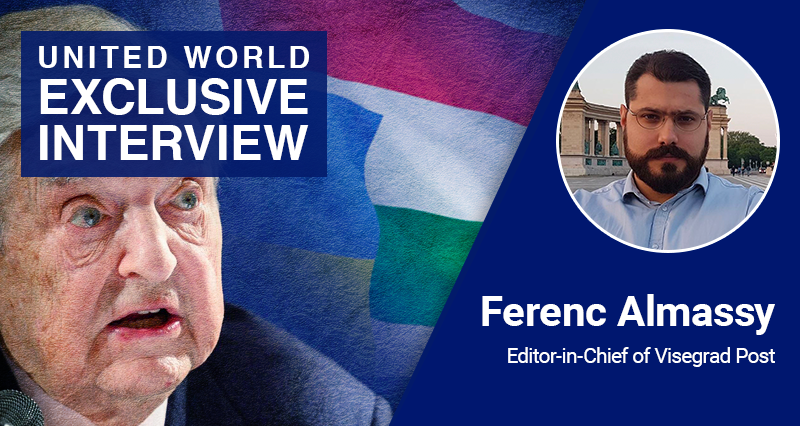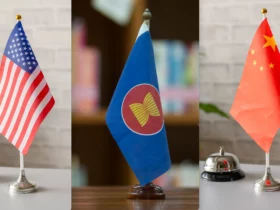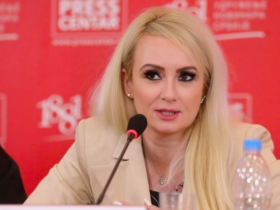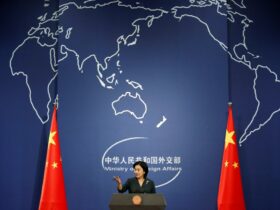In the second part of the interview with Ferenc Almassy, Editor-in-Chief of Visegrad Post, we asked him about Hungary-US relations, the background of the campaign against George Soros and the strengthening ties with the Organization of Turkish States.
Ferenc Almassy explained in detail Hungary’s policy of “passive resistance”, the impact of 150,000 Hungarians in Ukraine on the relations between the two countries, the specificity of Hungarians, which is determined by the fact that they have roots in the Central Asian steppes and are part of European culture, and Victor Orban’s “commitment to old-school diplomacy”.
Hungary’s ‘passive resistance’ to the US
There is the following debate among parties and intellectuals opposed to US imperialism: Do the rising right-wing parties and movements in Europe that we are talking about pursue a consistent and coherent political line against US hegemonism and what you call the “Brussels oligarchy” as far as it is part of it, or do they merely represent a reaction on the basis of shorter-term interests? What do you think?
This is a very good question and the answer is not simple. One reason is that the answer varies from one country to another. Parties and figures that are close to each other, even allies, have different relations with the US. Let’s be honest: Often the US and NATO is a red line. When you cross it, you automatically put yourself in some trouble. That’s why it is often avoided in European politics. It doesn’t bring more votes; it brings more troubles.
But the fact that they do not talk much about the issue does not mean that these parties do not have an opinion on it. In Hungary, we have a long tradition of “passive resistance”. Hungary lived under the Ottoman, Habsburg and Russian Empires. In World War 2, the Germans and now the EU and the US exercise influence. The Hungarian mindset is like this: Don’t openly oppose, but always criticize in an acceptable and proper way, always be aware of the limits and understand what can and cannot be done and when. Today, Hungary’s influencers and journalists criticize the US and the EU, but not the government itself. Those close to the government criticize the EU, but not the government itself. This is a way to reduce support for the US and the EU among the people. And this is a way to make some changes possible, maybe one day, when the right time comes. Who knows what the future will bring?
‘Hungary is neither at war with Russia nor with Ukraine’
You said “passive resistance”. So can this resistance turn from passive to active in the future when there is a more favourable condition?
It is possible. But the thing is, that passive resistance is often more effective and less risky than active resistance. Take, for example, Hungary’s position on Ukraine. Hungary, unlike many other countries, does not share the West’s 100 percent pro-Ukraine and anti-Russian stance. Hungary does not call what is happening in Ukraine a “war”, which implies that Ukraine is right to try to defend its national integrity and that the war must be stopped. Hungary is neither at war with Russia nor with Ukraine. This is not Hungary’s war. Many people in the West are acting as if they are part of the war.
What prevails is national interest
The Hungarian government is only concerned with Hungary’s national interests. And this mainly means cheap energy supply. Plain and simple. It”s very strange to the Hungarian people that others do not understand this. Of course war is a terrible thing and Hungarians are trying to help Ukrainian migrants, even Ukrainian soldiers are being helped in Hungarian hospitals. In this sense, there is support for Ukraine, but in the context of passive resistance I would like to point out that Hungary is not arming Ukraine. There are many reasons for this. One of them is that Hungary does not want other countries to cross the Ukrainian-Hungarian border.
150,000 Hungarians in Ukraine
There are about 150,000 Hungarians living in Ukraine, an ethnic minority, as a result of the 1st and 2nd World Wars. Hungarians there are not immigrants, they have been living there for 1000 years. Ensuring the safety of Hungarians in Ukraine is the priority in the Hungarian government’s Ukraine policy. In the last 10 years the two countries have had disagreements on this issue. Ukraine, like many new and weak states, tended to fear national minorities and tried to impose its own national identity on them. Hungarians in Ukraine do not have the right to learn their language in schools, while Ukrainians in Hungary do. So there is something wrong here. This should be taken into account when considering Ukrainian-Hungarian relations.
Türkiye has been engaged in an escalating struggle against George Soros and his institutions, especially in the last 4-5 years. Many parties, leaders and intellectuals, including the government, have joined this struggle. These people are following Hungary’s struggle against Soros. In the recent years, the Hungarian government has been waging a big campaign against Soros. Can you tell us a little bit about this campaign? How did it start, how did it unfold and what is the situation now?
George Soros started to be active in Central Europe in the 1980s. When Soros started to influence in Hungary, Hungary was still under communism. He increased his influence in the 1990s, especially after communism collapsed and the regime changed. He supported young liberals like Victor Orban, who was 25 at the time. Orban later severed ties with Soros in 1992-1993, and since then the friendly relationship with Soros has gradually declined.
‘Soros is not omnipotent’
Many people make a mistake in their assessment of Soros. It is not right to conceive of Soros as “the big bad guy”, “the guy who can change the world as he pleases”. Soros is more of a personification of something. Soros is the head of a network. No matter how much of a founder and financier he is, a network is more than a person. People use “Soros” as a shortcut to name this network, a more complex one, in an easy way. So, first of all, one should not make the mistake of seeing Soros as omnipotent.
‘A defender of national sovereignty must struggle against Soros’
Soros is a very rich political activist who embodies a vision. Soros is a sort of, I would say, “neo-Trotskyist” or “post-Trotskyist” internationalist. In this sense, he is not a founder, but a continuator. Internationalism is not new in Western countries and it has several faces. Some are more liberal, some more authoritarian. The Soros wing is more liberal. If you are for national sovereignty, the only thing you can do is to fight against Soros, his network and what he stands for.
Soros’ network is based on influencing public opinion, that is, national policy. It is normal for people to engage in political activism, trying to influence others. That’s the rule of the politics game and anyone can participate in it. But if at some point you come to the stage of influencing international institutions and start to regulate the relations and cooperation of different nations at the international level in the way you want, then, from that moment you reach an unacceptable point. This is what happened with Soros.
Netanyahu factor in the struggle against Soros
A funny fact is that the anti-Soros campaign in Hungary, which was launched in 2016-2017, started with Netanyahu’s involvement. Orban started the campaign after Netanyahu said “Yes, you can do it”. From that moment on, everyone started to attack Soros. Until that moment nobody could stand up to Soros because he was so powerful and influential. Especially in the media. So if you took any action against Soros, you were immediately labeled a “terrorist” and so on.
‘Anti-semitic’ and ‘conspiracy theorist’
Orban, with the legitimacy of being the head of government, brought the issue of Soros’ influence in Hungary’s national politics to the public spotlight, and over time the public began to find this influence unacceptable. He made it possible for people to talk about it without being labeled “anti-Semitic”, “conspiracy theorist”. This was a huge change. Orban’s biggest blow to Soros was to make the issue legitimately debatable. The rest is secondary.
What happened at the Central European University?
Orban wanted to apply the same rule in Hungary as in the USA. The rule was this: A university can only provide a diploma that is valid and accredited in another country if that university has a campus in that foreign country. The Central European University, headquartered in Budapest, was providing diplomas that were valid in the US, even though it did not have a campus in the US. This was not legal. Hungary offered Central European University two options: Either comply with the law or leave the country. The university refused to comply with the law and was expelled. After they were expelled, they started making propaganda like “the authoritarian regime did this”. But it is a lie. And it is Soros’ network that produces the lies. Hungary wanted to implement a law that is the same in the US. Even today, 4 years after the events took place, some people can say, “Hungary expelled the Central European University”. So why are students still riding bicycles at the university? Hungary did not close the entire university; only the branch that offers US accredited diplomas. The other parts continue to function smoothly.
From Central Asian steppes to Central Europe: the specificity of Hungary
Currently, Hungary is an observer member of the Organization of Turkic States (OST). Especially in recent years, we have been observing research and ideas about the Turkic origins of Hungarians from many circles and intellectuals in Hungary, including the government. Is this just a historical research or does it also have political implications?
I think both.
On the one hand, Hungary is part of European civilization. We are in the middle of Europe. (Laughs) But on the other hand, nobody knows why we are here. We are like “strange cousins” and this has been the case throughout history. We have a language that is unconnected with Latin, Germanic and Slavic languages.
Historically speaking, it is clear that Hungarians have deep roots in the steppes of Central Asia and in this respect are connected to the Turkic tribes. I think Türkiye’s leaders are well aware of this. Of course, it is also true that later on Hungarians mixed and intermingled with Germanic and Slavic tribes. Of course we are part of the European culture, but on the other hand, anyone who observes Hungary recognises that it has a cultural specificity.
‘Relations with Turkic states is a wonderful opportunity’
In terms of the second part of the question, assessing this historical reality is very much in line with Hungary’s interests today. On the geopolitical plane, good relations with the Turkic states are a wonderful opportunity for Hungary. This is also very important to get out of the Russia-US dichotomy. Europe is always forced to choose between these two. But Hungary does not want to be forced into this choice. In one of the previous questions I mentioned how important it is for Hungary to develop cooperation with the Turkic states independently of the EU, especially in terms of energy supply.
Orban’s commitment to the old-school diplomacy doctrine
Finally, I would like to add that Victor Orban is a leader with an old-school doctrine of sovereignty. It means that when it comes to diplomacy, you are negotiating with a country, not a regime, not a politician, not an ideology. The regime or the religion and so on of that country is not your business. Those are their own business and it is not for another country to judge that. Hungary is following a doctrine of non-interference in the internal affairs of other countries. Hungary is a small country. Why is the international public opinion so interested in Hungary? The answer lies mainly in this old-school diplomacy. State-to-state diplomacy is based on mutual respect.

















Leave a Reply